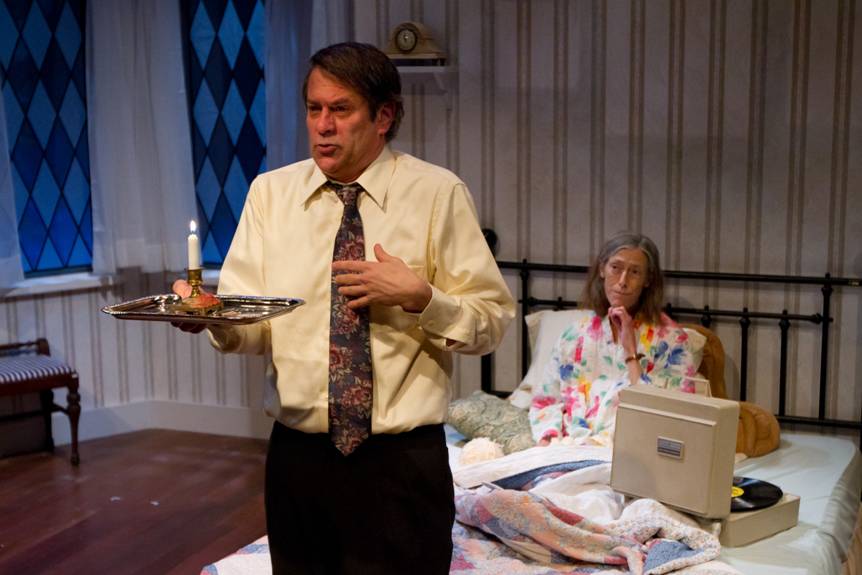Lantern Theater Company’s opening night production of Morris Panych’s VIGIL made a definite impression on me. Not normally a fan of dark comedies, I say this one is definitely a must see.

Ceal Phelan as "Grace" and Leonard C. Haas as "Kemp" in Lantern Theater Company's production of VIGIL. Photo by Mark Garvin.
One thing about this kind of comedy is that you know that behind all that comic outrage and the eccentricity of its characters is that there is a truth about us—besides the one that says we all need to be better people, or we just need to realize it. I’ll try not to reveal too much here because the show is well-worth the journey to the end.
The Canadian playwright has written a play, reminiscent of British style-cheeky comedy, intensely witty and brazen that is simultaneously outrageously funny and sad, and ultimately poignant. The rapid-fire scene and costume changes with the addition of music and sound effects (the clock ticking) reminded me of the ca-ching of the British sitcom, “Are You Being Served?”
The folks at Lantern did an excellent job from Nick Embree’s fine set design and Janet Embree’s extra special lighting design to Christopher Colucci’s wonderful sound and music. The unusual “V” seating arrangement for the audience worked very well with the show’s set and the blocking; there was not a bad seat in the house.
Both players were standouts, ideal fits for their roles. Leonard C. Haas seems to have been born to play “Kemp,” a total dork and loser all his life, but with cause, I think; and “Grace,” played by Ceal Phelan gives grand dimension to her “old and dying” character with just a look or a reaction to the unbelievable things “Kemp” says to her. And, he doesn’t hold back on the-kick-them-while-they’re-down comments either.
Peter DeLaurier, the director, says “Great plays are made about people with great needs and a few, like “Kemp” and “Grace” – who have kept themselves apart from their fellows for so long – have needs so intense that in their extremity it is at once deeply moving and very comical.”
He has realized the result here. The rich performance is a tribute to his directing choices. His blocking and staging are tight. The timing for both lights and sound is right on. He not only totally captures the ecstatic or poignant moments, he imprisons them and holds them for us.
A letter from a rich aunt alluding to her impending death to her loser nephew sends him rushing to her side to wait for her to die. They haven’t seen each other or even corresponded in over 30 years. What begins as a laugh-out-loud funny series of comedic confrontations turns to a sad “gotcha” as the relationship develops, unknown to at least one of the pair. We gain a deeper understanding of the meaner side of human nature–that we create our own obstacles to happiness, or someone else’s potential happiness, or even obstacles to a reasonably satisfactory existence that we all need.
How we get there, chalk up a lot up to the scenic and comedic timing. The play races at first–as it should and slows down a bit as the relationships develop–again, as they should. The play is full of surprises and twists, all good. The play’s unusual structure, where one character does most of the talking and the other is mostly silent–a straight man–adds interest and makes the play work. “Kemp” does almost all the talking. “Grace” does all the reacting. It becomes increasingly funny when she adds words and he reacts to her for a change. Each in their own way is an expert, and what they both do is all terrific acting.
We laugh at people who laugh at themselves, but we somehow feel justified in that. It is that very act of laughing when we probably shouldn’t that makes us look at things more seriously as our characters begin to be less self-deprecating and more real. Of course, we can’t help the laughing at all; that, too, is human nature. Panych thinks we can learn from that whole experience. I hope he’s right. Watching someone die is never fun (and nothing to laugh about except here), but not saying what you should have said before that someone dies is the worst.
It’s okay to enjoy yourself and learn something—even if you already know it. It’s life. And it’s great theatre, too.
VIGIL
by Morris Panych
Directed by Peter DeLaurier
May 19 – June 12, 2011
Lantern Theater Company
at St. Stephen’s Theater
10th & Ludlow Streets
Philadelphia, PA 19107
215.829.0395
www.lanterntheater.org


